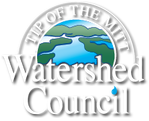Volunteer Stream Monitor (VSM) Training & Workshop
Tuesday, August 27, 2024
6 – 8 PM
Tip of the Mitt Watershed Council (426 Bay Street, Petoskey)
Join us for our next training session at Tip of the Mitt Watershed Council. The workshop begins at TOMWC with a short presentation, followed by a short (less than 1/2 mile) walk down to the Bear River for hands-on training. Pizza and refreshments provided.
What to wear: Dress for the weather and expect to get in the water up to your ankles or shins. Waterproof waders will be provided, but if you have a pair feel free to bring your own.
What to bring: Layers of clothes as needed, hat, comfortable outdoor shoes, and a reusable water bottle. Bug spray and sunscreen is available.
What to expect: After a quick training session and pizza at the Watershed Council office, you’ll walk down to the Bear River for hands-on training. You’ll wade into the Bear River along the shore and collect macroinvertebrates in a net. Collected macroinvertebrates are identified and sorted by species. Expect to get little muddy depending on the conditions and be prepared to walk over uneven terrain.
About the VSM Program
Volunteer teams monitor the water quality of wadable streams two times a year, during the spring (May) and fall (September). Teams consist of 3 or more volunteers, including a team leader, team collector and at least one picker. Prior to the outdoor field data collection, volunteers receive specialized training. Following the field activities, volunteers and experts gather for an indoor identification session.
Trainings are held one to two times a year for team leaders and collectors. The training provides volunteers with information about program structure and goals, methodologies, field equipment, filling out data forms and biology of macroinvertebrates (e.g. aquatic insects, crustaceans, and other small aquatic “critters”). In addition, volunteers accompany Watershed Council staff to a nearby stream for an outdoor practicum to go over field methods and techniques. Leaders are trained to coordinate team activities in the field, collect pertinent information recorded on survey forms, and ensure quality control in data collection. Collectors are trained to thoroughly sample all habitat types found in stream ecosystems.
Watershed Council staff assign volunteers to teams and teams are given two sample sites to collect data from. On field days, volunteers meet at a predetermined sample site to begin their work.
Typically, volunteers spend 2-3 hours at each site collecting information. While leaders note relevant information on the survey form, collectors use a net to vigorously sample all habitats in the stream reach, emptying the net’s contents on trays so that pickers can pick and preserve specimens in alcohol for later identification.
Identification of aquatic macroinvertebrates takes place a few weeks after field day. Volunteers congregate at the Watershed Council office with macroinvertebrate samples in hand. The macroinvertebrates collected in the field are sorted by volunteers using trays and identification keys, largely based upon physical appearance, though utilizing volunteer taxanomic knowledge when able. Then, local experts trained in macroinvertebrate identification, sit down with volunteers to verify identifications. Then specimens are recorded by scientific names, counted, and preserved in fresh alcohol.
All data from field and indoor sessions is inputted into a database created and maintained by the Watershed Council. Information gathered by volunteers is used by Tip of the Mitt Watershed Council to determine the relative health of the stream, locate specific problem areas, compare sample sites to one another, and look at changes over time. Furthermore, data will be used by Michigan EGLE to identify sites that need further assessment and as supplemental data for statewide water resource management.
Get Involved
If you enjoy being outdoors and exploring the fascinating stream ecosystems of Northern Michigan, please consider becoming involved in the Tip of the Mitt Volunteer Stream Monitoring Program. Volunteer commitment is approximately two days a year (four half-days) and no experience is required. For further information or to volunteer for this project, please contact us by phone at (231) 3



